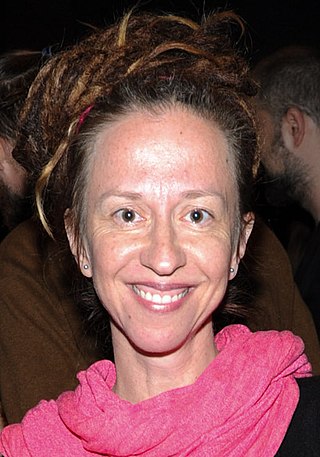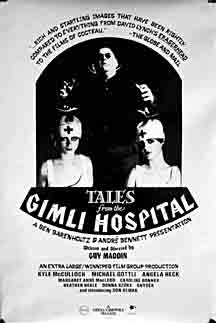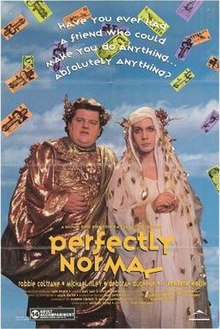
Paul Lewis Quarrington was a Canadian novelist, playwright, screenwriter, filmmaker, musician and educator.

Cinema in Canada dates back to the earliest known display of film in Saint-Laurent, Quebec, in 1896. The film industry in Canada has been dominated by the United States, which has utilized Canada as a shooting location and to bypass British film quota laws, throughout its history. Canadian filmmakers, English and French, have been active in the development of cinema in the United States.

Zero Patience is a 1993 Canadian musical film written and directed by John Greyson. The film examines and refutes the urban legend of the alleged introduction of HIV to North America by a single individual, Gaëtan Dugas. Dugas, better known as Patient Zero, was the target of blame in the popular imagination in the 1980s in large measure because of Randy Shilts's American television film docudrama, And the Band Played On (1987), a history of the early days of the AIDS epidemic. Zero Patience tells its story against the backdrop of a romance between a time-displaced Sir Richard Francis Burton and the ghost of "Zero".

The Decline of the American Empire is a 1986 Canadian sex comedy-drama film directed by Denys Arcand and starring Rémy Girard, Pierre Curzi and Dorothée Berryman. The film follows a group of intellectual friends from the Université de Montréal history department as they engage in a long dialogue about their sexual affairs, touching on issues of adultery, homosexuality, group sex, BDSM and prostitution. A number of characters associate self-indulgence with societal decline.

I've Heard the Mermaids Singing is a 1987 Canadian comedy-drama film written and directed by Patricia Rozema and starring Sheila McCarthy, Paule Baillargeon, and Ann-Marie MacDonald. It was the first English-language Canadian feature film to win an award at the Cannes Film Festival.

Ingrid Veninger is a Canadian actress, writer, director, producer, and film professor at York University. Veninger began her career in show business as a child actor in commercials and on television; as a teen, she was featured in the CBC series Airwaves (1986–1987) and the CBS series Friday the 13th: The Series (1987–1990). In the 1990s, she branched out into producing, and, in 2003, she founded her own production company, pUNK Films, through which she began to work on her own projects as a writer and director.

Comic Book Confidential is an American/Canadian documentary film, released in 1988. Directed by Ron Mann and written by Mann and Charley Lippincott, the film is a survey of the history of the comic book medium in the United States from the 1930s to the 1980s, as an art form and in social context.
The Winnipeg Film Group (WFG) is an artist-run film education, production, distribution, and exhibition centre in Winnipeg, Manitoba, committed to promoting the art of Canadian cinema, especially independent cinema.

The Outside Chance of Maximilian Glick is a 1988 Canadian film based on the novel by Morley Torgov. The film was shot in Winnipeg and Beausejour, Manitoba.

Tales from the Gimli Hospital is a 1988 film directed by Guy Maddin. His feature film debut, it was his second film after the short The Dead Father. Tales from the Gimli Hospital was shot in black and white on 16 mm film and stars Kyle McCulloch as Einar, a lonely fisherman who contracts smallpox and begins to compete with another patient, Gunnar for the attention of the young nurses.

Joshua Then and Now is a 1985 Canadian film and a TV mini-series, adapted by Mordecai Richler from his semi-autobiographical novel Joshua Then and Now. James Woods starred as the adult Joshua, Gabrielle Lazure as his wife, and Alan Arkin as Joshua's father. It was directed by Ted Kotcheff who had previously directed Richler's The Apprenticeship of Duddy Kravitz.
Yves Simoneau is a Canadian film and television director.
The Paper Wedding is a 1989 made for television Canadian film directed by Michel Brault. It was entered into the 40th Berlin International Film Festival.

In the Shadow of the Wind is a Canadian drama film, directed by Yves Simoneau and released in 1986. It was entered into the 37th Berlin International Film Festival.

Bethune: The Making of a Hero is a 1990 biographical period drama film directed by Phillip Borsos. The film is about the life and death of Norman Bethune, a Canadian physician who served as a combat surgeon during the Chinese Civil War. The cast includes Donald Sutherland as Bethune, Helen Mirren as Frances Penny Bethune, Colm Feore as Chester Rice, and Anouk Aimée as Marie-France Coudaire.
The Toronto New Wave refers to a loose-knit group of filmmakers from Toronto who came of age during the 1980s and early 1990s.
Diplomatic Immunity is a Canadian political thriller film, released in 1991. It marked the narrative feature film debut of Sturla Gunnarsson.
Deadly Currents is a Canadian documentary film, directed by Simcha Jacobovici and released in 1991. The film explores the Israeli–Palestinian conflict, profiling various people on both sides of the dispute.
Two Can Play is a Canadian drama film, directed by Micheline Lanctôt and released in 1993. The film stars Pascale Bussières and Pascale Paroissien as adult sisters meeting for the first time, not having previously known of each other's existence, and intersperses the dramatic storyline with scenes in which the actresses are interviewed about the process of building their characters.
A Rustling of Leaves: Inside the Philippine Revolution is a 1988 Canadian documentary by Nettie Wild about the political upheaval in the Philippines following the fall of Ferdinand Marcos and the People Power Revolution.












